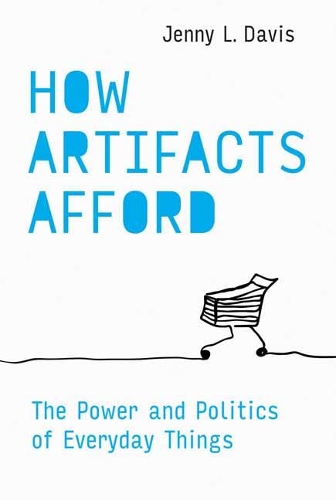
How Artifacts Afford: The Power and Politics of Everyday Things
(Hardback)
Available Formats
Publishing Details
How Artifacts Afford: The Power and Politics of Everyday Things
By (Author) Jenny L. Davis
MIT Press Ltd
MIT Press
3rd November 2020
United States
Classifications
General
Non Fiction
Media studies
Humancomputer interaction
Technical design
Product design
658.5752
Physical Properties
Hardback
192
Width 137mm, Height 203mm
Description
A conceptual update of affordance theory that introduces the mechanisms and conditions framework, providing a vocabulary and critical perspective A conceptual update of affordance theory that introduces the mechanisms and conditions framework, providing a vocabulary and critical perspective.Technological affordances mediate between the features of a technology and the outcomes of engagement with that technology. The concept of affordances, which migrated from psychology to design with Donald Norman's influential 1988 book, The Design of Everyday Things, offers a useful analytical tool in technology studies-but, Jenny Davis argues in How Artifacts Afford, it is in need of a conceptual update. Davis provides just such an update, introducing the mechanisms and conditions framework, which offers both a vocabulary and necessary critical perspective for affordance analyses. The mechanisms and conditions framework shifts the question from what objects afford to how objects afford, for whom, and under what circumstances. Davis shows that through this framework, analyses can account for the power and politics of technological artifacts. She situates the framework within a critical approach that views technology as materialized action. She explains how request, demand, encourage, discourage, refuse, and allow are mechanisms of affordance, and shows how these mechanisms take shape through variable conditions-perception, dexterity, and cultural and institutional legitimacy. Putting the framework into action, Davis identifies existing methodological approaches that complement it, including critical technocultural discourse analysis (CTDA), app feature analysis, and adversarial design. In today's rapidly changing sociotechnical landscape, the stakes of affordance analyses are high. Davis's mechanisms and conditions framework offers a timely theoretical reboot, providing tools for the crucial tasks of both analysis and design.
Reviews
How Artifacts Affordis nothing short of magical! Jenny Davis describes what technologies can do in social life. The writing is crisp and clear and the work is groundbreaking. This book will teachboth scholars and students alikea socially informed framework for thinking about how technologies shape our world, and I predict it will have a field-defining impact.
Gina Neff, Senior Research Fellow and Associate Professor, University of Oxford
How Artifacts Affordoffers a clarifying survey of the relationship between humans and technologies via the filter of affordance theory. Attentive to detail and always aware of the importance of the mundane, Jenny Davis provides a schematic for understanding how people make, and are made by, objects.
Nathan Jurgenson, author ofThe Social Photo;Cofounder and Cochair of the Theorizing the Web Conference; Founder and Editor-in-Chief ofReal Life magazine; and Sociologist at Snap Inc.
Author Bio
Jenny L. Davis is a sociologist at the Australian National University.
